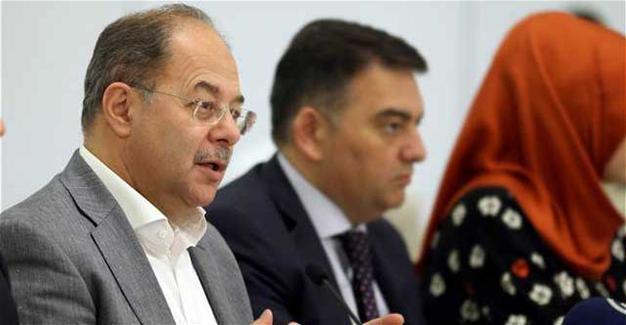Turkey to hire Syrian doctors at migrant health centers
ISTANBUL
 Syrian doctors and medical personnel will be employed at health centers for migrants, Health Minister Recep Akdağ has said, adding that there were a total of 27 migrant health centers in Istanbul.
Syrian doctors and medical personnel will be employed at health centers for migrants, Health Minister Recep Akdağ has said, adding that there were a total of 27 migrant health centers in Istanbul. “Syrian doctors and medical personnel will be employed in these centers,” Akdağ said during a fast-breaking event late on June 11, adding that efforts were underway to improve the migrant centers and establish new facilities.
“We provided the doctors with training. We are carrying out exams. Honestly, we saw that they had generally been well-trained,” he said.
A significant number of Syrian doctors and health personnel cannot obtain equivalency certificates because it is difficult to contract any official in the country, Akdağ said, while noting that they often had diplomas in hand.
“We are developing a system that will allow Syrians to serve, and it will only work for Syrians,” he added.
During his speech, Akdağ also talked about the family practitioner practice, saying the ministry aimed to assign one doctor for every 2,000 Istanbul residents.
“We have 1,114 family health centers in Istanbul at the moment. We have 4,368 family practitioner units.
According to these numbers, one family practitioner is assigned to take care of 3,300 people. Our aim is to decrease this number to 2,000,” he said, adding that the ministry were handling the healthcare services in Istanbul “in a special way because the city is massive.”
“We believe that Istanbul deserves some special treatment. The aim to assign one family practitioner to 2,000 people requires the construction of new family health centers or the enlargement of the current ones.
We will accomplish this in the following years. We also want to be fast in intervening in emergency cases in Istanbul, and we will increase the number of mobile teams,” Akdağ also said.
Noting that severe penalties had been imposed on the businesses that do not comply with a ban on smoking indoors, Akdağ said the ministry had “no tolerance” on violations.
“We are telling all business owners that the areas that can be both closed and open are counted as closed spaces. If it’s an area that can be closed, then it’s considered a closed space,” he said.
“There are very heavy penalties. Depending on the size of the business, there are fines of between 5,000 and 10,000 Turkish Liras. If the violation occurs for a second time, the fine is doubled and if it happens once again, we may order the closure of the businesses for up to a month,” Akdağ said.
During his speech, Akdağ said Turkey was a country that had taught the world on the issue, meaning it could not permit any violations.
“The smoking ratios fell from 32 to 27 percent in 2012 in 2008. Unfortunately, there was an increase between 2012 and 2014 that reached 32 percent. The numbers of 2016 are more pleasant; we decreased it to 30.5 percent once again,” he added.
















